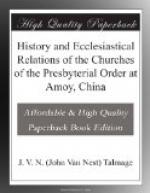[Footnote 1: If this language seem too strong or uncalled for, see Appendix B, at the end.]
I have been advised by some to delay the publication of this paper a few months, until we learn the effect of the decision of the last Synod on the Mission at Amoy, and see what course the Church there may feel compelled to adopt. I do not see the force of such advice. Whatever may be the course of the Church there, the intrinsic merits of the question will be unchanged thereby. Besides this, I cannot afford such delay. I have been looking forward to as speedy return as possible to that field of labor. Would it be right to leave the whole subject to the eve of my departure, and thus shut myself off from the possibility of defending or further explaining my views, if such defense or explanation be called for?
I have been asked, Why not bring this subject before the Church through the columns of the Christian Intelligencer? This question, after what has been said above, need not now be answered. Doubtless the editor is responsible for what appears in his columns. The only resource left the Mission seems to be the one I have chosen.
I regret the necessity of discussing the subject, since the action of the last Synod, but we could not discuss it previously without running counter to the same advice which would now restrain us. I do not at all suppose, however, that by the course I am taking I shall become guilty of disobedience “to the authority of Synod.” Neither should it be the occasion of creating “dissensions in the churches.” The discussion of any important subject in a proper spirit is neither opposed to the doctrines of the Sacred Scriptures, nor to the doctrines of the Dutch Church, and I am willing to leave it to those who may read the following pages to decide whether there be in them any manifestation of an improper spirit. We, and those who differ from us, are all seeking the same end, i.e. the glory of God through the advancement of his cause. All that I ask for myself and co-laborers is an impartial hearing.




